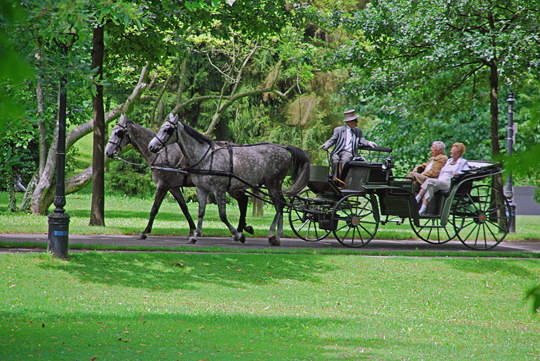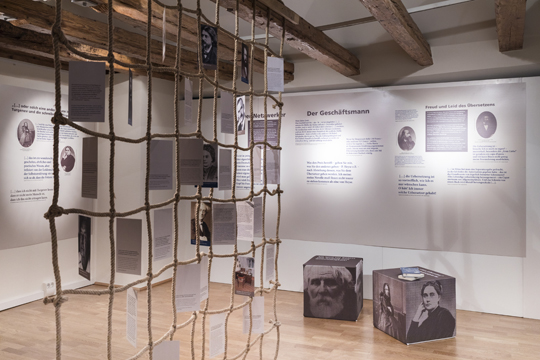A Stopover in the Cultural Biotope
Freiburg, Sep 25, 2018
Museums are, as their name suggests, places to muse. But are they also places of leisure? Not so much, if the visit forms part of an exhibition marathon or the compulsory cultural program. Yet in Baden-Baden the museum will be turned into a place of leisure: they are planning a Museum of Leisure, “Muße” in German – making it the “Mußeum”. Elisabeth Cheauré had the idea and is involved in realizing it. The Freiburg professor of Slavic Studies heads the special research area (SFB) “Muße. Grenzen. Raumzeitlichkeit. Praktiken”, or “Leisure. Boundaries, Time & Space, Methods”, which involves six faculties at the University of Freiburg. Now, as a kind of trial run for the transfer project, the exhibition “Russia in Europe – Europe in Russia. 200 years of Ivan Turgenev” has opened at the Stadtmuseum Baden-Baden in September.
 Ivan Turgenev, a citizen of the world between Russia and the West: the exhibition on the life and work of the author can be seen until 3rd March 2019.
Ivan Turgenev, a citizen of the world between Russia and the West: the exhibition on the life and work of the author can be seen until 3rd March 2019.
Photo: Stadtmuseum Baden-Baden
On Lichtentaler Allee in Baden-Baden, near the Stadtmuseum, people are strolling around the paths and across the grass of one of the most beautiful landscape gardens in Germany. Lichtentaler Allee is a place to breathe deeply and relax, time passes more slowly here. Sometimes it even seems to have stood still on the not uncommon occasion when a coachman dressed in full livery and top hat drives his coachload of elegantly-clad passengers through the natural idyll.
The flair that imbued the spa town in the 19th century still hangs in the air today. It would be far from wrong to describe the “summer capital of Europe” as a glamorous place of leisure, even an international center of recreation and idleness at that time. Here, the members of high society met: the powerful, the rich and the refined.
This alone makes Elisabeth Cheauré call Baden-Baden the “ideal place for this exhibition. As a spa town and cultural biotope, the city is naturally seen as being a place of leisure.” In cooperation with Freiburg Slavicists Dr. Regine Nohejl and Olga Gorfinkel, Cheauré has realized the exhibition to commemorate the bicentenary of the Russian author Ivan Turgenev. Turgenev, who lived here for a total of seven years, wrote to his brother in 1865: “I have a universal remedy (…) come to Baden-Baden; since I have been here, all my former ailments have vanished.”
 The flair that imbued the spa town in the 19th century still hangs in the air today. Photo: City of Baden-Baden
The flair that imbued the spa town in the 19th century still hangs in the air today. Photo: City of Baden-Baden
Was the great litterateur a man of leisure? “Well, in fact he was fairly restless, a perpetual traveler,” says Cheauré. “He traveled all across Europe, either by stagecoach or by train. But of course he also allowed himself periods of leisure now and then: for conversations in the salons, or when hunting, his hobby.” “And when writing letters,” interjects Olga Gorfinkel, “even if this didn’t always evolve into work.” We know today that Turgenev corresponded with at least 573 people, adds Regine Nohejl, “Once he writes in a letter that he will have to write throughout the night: [because of a] pile of letters.”
Immersion without overstimulation
The leisure research defines its purpose as “productive unproductivity”, says Cheauré. However, leisure has less to do with the content of the exhibition than its mode of presentation. The goal of the exhibition, she continues, is “to enable [visitors] to have a leisure experience. This will only succeed without overstimulation and with the possibility of choosing for oneself what to see and where to delve deeper. People’s physicality and senses should be thoroughly involved.”
A museum visit as a sensory stroll, if you will. As well as audiovisual displays, the exhibition offers tactile, olfactory and even taste stimuli. For instance, in the introductory first room there is a samovar for a spot of tea. Very few objects are placed behind glass in a cabinet; almost everything can be touched and picked up. There are even subtle perfumes designed to suit the theme of a room. In addition, cube seating invites people to idle and browse the novels of Turgenev that are placed around the rooms. The graphic design attempts to avoid great wastelands of text by breaking information into smaller units in varying fonts and sizes. And last but not least, visitors are given the opportunity to make use of the forms of communication that were common in Turgenev’s day: there are an ink pen, a pot of ink and postcards.
 Meeting points: Ivan Turgenev corresponded with more than 570 people and networked with contacts around the world. Photo: Stadtmuseum Baden-Baden
Meeting points: Ivan Turgenev corresponded with more than 570 people and networked with contacts around the world. Photo: Stadtmuseum Baden-Baden
Travel, love and playful elements
The path through the exhibition breaks down into themed rooms that cover aspects from Turgenev’s life. It is about travel and love, communication and networking – but above all, taking Turgenev as an example, essentially about the resonant relationship of Russia and Europe. As the most famous Russian intellectual of his time in the West, he was also a crucial intermediary between Russia and the West. In the controversy between “Slavophiles” and “Westerners” he took the position of the latter. In 1867 this resulted in a legendary dispute with his counterpart Fyodor Dostoevsky. This is recreated for the exhibition in a video by young Freiburg actors with the financial support of the Freiburg Tsvetaeva Center.
The Freiburg academics believe the romantic concepts of the Russian soul or backwardness in contrast to the western focus on reason and modernity are cultural attributions that linger until today and need to be examined for their realism. Another goal of the exhibition is to “soften rigid positions”, as Cheauré puts it, in the current debate on the relationship of the West to Russia – effectively with the aid of leisure. “Through different forms of presentation, such as playful elements like a quiz about famous statements on the relationship between Russia and Europe, we want to encourage visitors to think carefully.”
The pioneering project of the three researchers is designed to be a role model and significant. However, the SFB, the “giant research ship”, as spokesperson Elisabeth Cheauré calls it, has only made a stopover in the Stadtmuseum Baden-Baden. The final destination of the Slavicist contribution to the project is the “Mußeum” – a Museum of Literature and Leisure, which will open at the Stadtbibliothek Baden-Baden in 2020. Now, the three academics can relax and wait for feedback from visitors. And this is being precisely scientifically measured too: there are questionnaires waiting in the exhibition rooms.
Hans-Dieter Fronz
Special research area “Muße. Grenzen, Raumzeitlichkeit, Praktiken”

